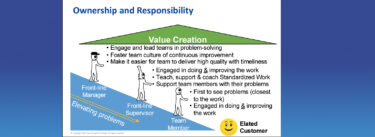Taichi Ohno identified seven forms of waste, and lean insiders often add an eighth: the waste of human resources. At the risk of being guilty of it myself, in this post, I will propose a ninth: the waste of overthinking.
Rationality plays a starring role in our Western culture. Its roots, tracking back to Socrates and the Greeks, were refreshed during the Renaissance, and brought to flower by science. And indeed, reason is required in both our work and personal lives. However, can there be too much of a good thing?
Most of us grew up raising our hands in class and being rewarded by our teachers for thinking more, not less. Later, most leaders in the corporate meritocracy were shaped by role models from a business culture glorifying “brilliant” executives — Jack Welch in the 1990s or Elon Musk today. As a result, we mistakenly attribute their success to thinking alone. We are conditioned to overthink and as a result it feels good and becomes a habit.
I’ve often been guilty of overthinking, seeking too much information, applying models, and as a result, getting stuck in abstraction. For example, I once led a needs assessment in a machinery company that used different software and legacy systems at each of half a dozen sites worldwide. The CEO asked me to help his site leaders draft a strategy to upgrade and integrate worldwide engineering systems. To identify problems and opportunities, I developed a survey and deployed a team to interview scores of engineers. Next, I sorted the data into site-specific lists of technical issues and ideas for improvement. Still, I became stuck when I considered facilitating an executive discussion across six lists and concluding a two-day meeting with a unique action plan for each site. Some sites used software and legacy data bases that others didn’t, and there were no metrics to quantify and compare the effectiveness of any of them.
The data wasn’t apples to apples; it was a fruit salad!
Avoid the waste of overthinking by making mindfulness your default state.Fortunately I stumbled onto a useful way to unlock my mental logjam. I asked one of my peers to be a sounding board and he didn’t overthink it. He said, “just give each site leader his own data in advance and tell them to vie for a company strategy that best serves his engineers. With a bit of facilitation and the CEO’s final priorities and limits, it will all come out in the wash.” It did — strategy set. Workshop a success. I had been guilty of the ninth waste.
Who hasn’t become stuck in overthinking in response to a critique from a boss, a slight by a friend, or a bad investment? The internal dialogue of “coulda woulda shoulda” is one we all know well. In fact, researcher Jordan Poppenk quantified the velocity of individuals’ thoughts in experiments where he measured the duration of each one, He found that his subjects averaged 6,200 thoughts per day — one every 10 seconds or so. When we let excessive thinking become a habit, we often spin down the drain into the sewer of the ninth waste. What can you do to reduce overthinking? Here are a few tips.
- Understand that your thinking is a tool, and never believe that it is the “truth.”
- Understand that your mind has numerous innate biases.
- Go and see actual problem situations rather than trying to understand them from a distance.
- Use a practical, action-oriented peer as a sounding board.
- When you find yourself lost in a cogitating loop, ask: “What’s the problem I’m trying to solve?”
- Don’t think in haste unless life or limb is at risk.
- Consider your thoughts as mere hypotheses and test them in a dry run or experiment.
- Make mindfulness your default state of mind.
An effective lean practice would make mindfulness the default state, and thus reduce excess thinking. Then lean leaders and coaches would laser focus on identifying solutions (or counter-measures), developing people’s capabilities better, and being a more effective catalyst for rapid lean implementation.
What to Do Next
Stay in the know about what the foremost lean thinkers and practitioners are doing to solve critical problems. With an Annual Enterprise Subscription, you can deliver a full year of unlimited access to seminars, practical exercises, and on-demand recordings of all VLX presentations to everyone at your organization. Individuals who register for the Annual Single-User Subscription gain the same benefits for themselves. The next seminar starts June 21, 2021. Learn more and subscribe.





